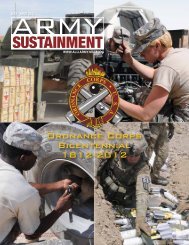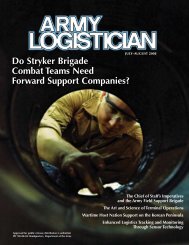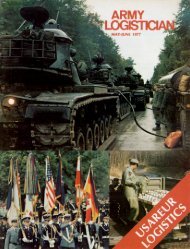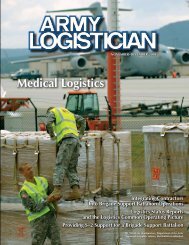Life-Cycle Management - Army Logistics University - U.S. Army
Life-Cycle Management - Army Logistics University - U.S. Army
Life-Cycle Management - Army Logistics University - U.S. Army
You also want an ePaper? Increase the reach of your titles
YUMPU automatically turns print PDFs into web optimized ePapers that Google loves.
‘Lily-Pad’ ‘Lily-Pad’ Basing Basing Concept Concept<br />
Put to the Test Test<br />
BY CAPTAIN DAVID C. CHANDLER, JR.<br />
As the <strong>Army</strong> transforms to an expeditionary force,<br />
a new concept called “lily-pad” basing is being<br />
developed for basing troops overseas. Under this<br />
concept, the United States would not have permanent,<br />
large-scale military installations in another country.<br />
Instead of building its own bases as it has in the past, the<br />
<strong>Army</strong> would use other countries’ existing facilities. It<br />
would have only a skeletal staff and an agreement with<br />
the host country that the base could be used as a forward<br />
operating base in a time of crisis. These “lily-pad”<br />
bases would be austere training and deployment sites<br />
often in areas not previously used for U.S. bases.<br />
Can the <strong>Army</strong>’s new method of expeditionary operations<br />
be supported using the “lily-pad” basing concept?<br />
Soldiers of the 21st Theater Support Command (TSC)<br />
in Kaiserslautern, Germany, sought to answer that<br />
question. Their task was to deploy several hundred soldiers<br />
from Illinois to an austere location in Eastern<br />
Europe; provide those soldiers with food, fuel, and supplies;<br />
and allow them to train in preparation for a<br />
notional follow-on deployment to a combat or peacekeeping<br />
theater of operations. The operation took place<br />
in the Novo Selo Training Area in central Bulgaria in<br />
July and August 2004. About 1,300 soldiers, contractors,<br />
and host nation workers participated.<br />
The objectives of the exercise were to—<br />
• Test expeditionary force operations by moving<br />
troops from the continental United States and U.S.<br />
bases in Europe to an austere location and enabling<br />
them to conduct quality training.<br />
• Build international relations with Bulgaria.<br />
• Test the Bulgarian infrastructure’s potential for<br />
supporting future operations involving U.S. forces.<br />
Novo Selo Training Area<br />
U.S. <strong>Army</strong> Europe’s 18th Engineer Brigade served<br />
as the higher control for the exercise. Units from the<br />
21st TSC formed Task Force Log and served as the<br />
core for the logistics support mission under the command<br />
and control of the 37th Transportation Command<br />
from Kaiserslautern, Germany. The 212th<br />
Mobile <strong>Army</strong> Surgical Hospital from Miesau, Germany,<br />
and the 236th Medical Company (Air Ambulance)<br />
from Landstuhl, Germany, provided medical<br />
support. The training unit was the 2–130 Infantry Battalion,<br />
an Illinois <strong>Army</strong> National Guard unit.<br />
Local Bulgarian contractors—coordinated by<br />
Halliburton Kellogg Brown & Root (KBR) and the U.S.<br />
Joint Contracting Command (JCC)—established the life<br />
support area at Novo Selo (shown above), consisting of<br />
facility tents (chapel; <strong>Army</strong> and Air Force Exchange<br />
Service; dining; and morale, welfare and recreation),<br />
sleep tents, and containerized headquarters buildings.<br />
KBR also provided services such as operation of the<br />
dining facility and upkeep of the life support area.<br />
The Bulgarian economy supplied many products and<br />
services for the exercise. One exercise goal was to maximize<br />
host nation support and build relations with the<br />
Bulgarian Ministry of Defense (BMOD) using a statement<br />
of requirements and a North Atlantic Treaty Organization<br />
standardization agreement. However, the<br />
BMOD had only a few existing civil contracts and could<br />
not reliably establish new ones in time, so its contractual<br />
support was limited to the provision of bulk fuel, force<br />
protection augmentation, military vehicle support, and<br />
military liaison officers. The rest of the contracts were<br />
established by JCC or KBR. JCC contracted for laundry,<br />
ARMY LOGISTICIAN PROFESSIONAL BULLETIN OF UNITED STATES ARMY LOGISTICS 11







